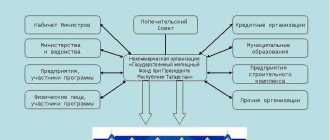The main area in which subsidies are provided to large families in 2021 is the purchase of real estate. Through such subsidies, the state is trying to help parents with many children overcome financial difficulties (which will inevitably arise given our, frankly, low standard of living) and buy housing that is suitable in size.
Large families can receive subsidies not only from the state budget, but also from the municipal budget - those families who live in regions with poor demographic characteristics are luckier.
Which family is considered large in 2021?
The general legislation of the Russian Federation calls a large family raising three children. However, many parents encounter problems when trying to obtain preferential status and entitlement privileges; to restore justice, they often have to go to court.
The source of the problems is Decree of the President of the Russian Federation No. 431 “On measures for social support of large families,” which states that the status of a large family is established by the authorities of the constituent entities of the Russian Federation.
There are other requirements that must be met in order to qualify for subsidies:
- All children must be under 18 years of age. There is an exception: if the child receives higher education, the age limit increases to 23 years. In this case, it does not matter whether the child studies on a budget or in a paid department, but the form of education plays a role - only “points” give the right to privileges.
- All children must be registered with their parents. Moreover, it doesn’t matter where they actually live. For this reason, it is not advisable for a student from a large family to live in a university dormitory - then he will be issued a temporary registration and the family will be deprived of privileges.
Therefore, if the municipality determines that at least 5 children are needed for preferential status, so it will be - the norms of general legislation take on secondary importance. For the “traditional” republics of Russia, having a large number of children is in the order of things, so the bar is set higher there.
All-Russian public organization of members of large families
Which families are considered large?
Federal legislation does not define a large family. However, in accordance with Decree of the President of the Russian Federation No. 431 “On measures for social support of large families”, in each region executive authorities independently determine the categories of families that are classified as large and in need of additional social support, taking into account national and cultural characteristics in social economic and demographic development of the region and establish social support measures for large families.
Thus, all regions of the Russian Federation have adopted local laws on social support for this category of citizens, which can give different definitions and establish their own standards.
As a general rule, families with many children are recognized as families permanently residing in the region, including foster families, whose parents (guardians, trustees) have three or more children (natural, adopted, taken under guardianship (trusteeship), stepsons and stepdaughters ) under the age of 18 years or older, full-time students in educational institutions, regardless of their organizational and legal forms, until the end of their studies, but no more than until they reach the age of 23 years. In some regions, a family loses its status as a large family immediately after the eldest child reaches adulthood, regardless of whether he went to get an education or not. For example, in the Republic of Adygea, in accordance with the law of September 28, 1994 N 117-1 “On the protection of family, motherhood, paternity and childhood.”
What benefits are available to large families in Russia?
In accordance with Decree of the President of the Russian Federation No. 431 “On measures for social support of large families,” they have the right to:
- a discount of no less than 30% of the established fee for the use of heating, water, sewerage, gas and electricity, and for families living in houses that do not have central heating - from the cost of fuel purchased within the limits established for sale to the public in a given territories;
- free issuance of medications purchased according to doctor’s prescriptions for children under 6 years of age;
- free travel on intracity transport (tram, trolleybus, metro and city buses (except taxis), as well as on suburban and intradistrict buses for students of secondary schools;
- admission of children to preschool institutions in the first place;
- free meals (breakfasts and lunches) for students of general education and vocational educational institutions at the expense of general education funds and deductions from their production activities and other extra-budgetary contributions;
- free provision, in accordance with established standards, of a school uniform or a replacement set of children’s clothing for attending school classes, as well as sports uniforms for the entire period of children’s education in a comprehensive school at the expense of universal education funds or other extra-budgetary funds;
- one day a month for free admission to museums, cultural and recreational parks, as well as exhibitions;
- assistance to parents with many children who want to organize peasant (farm) households, small enterprises and other commercial structures, ensure the allocation of land plots for these purposes, as well as provide benefits for collecting land tax and rent in the form of full or partial exemption from tax for a certain period or lowering tax rates; provide gratuitous financial assistance or interest-free loans to reimburse expenses for the development of a peasant (farm) economy; provide for complete or partial exemption from payment of registration fees from individuals engaged in entrepreneurial activities;
- priority allocation of garden plots;
- provision of preferential loans, subsidies, interest-free loans for the purchase of building materials and housing construction;
- assistance in finding employment for parents with many children, the possibility of them working under flexible forms of work (part-time work, part-time work week, work from home, temporary work, etc.).
*However, despite the fact that paragraph 3 of this Decree of the President of the Russian Federation dated May 5, 1992 No. 431 “On measures for social support of large families,” the Ministry of Finance of the Russian Federation, together with the Ministry of Social Protection of the Population, was instructed to develop the procedure and conditions for reimbursement of expenses for the implementation of measures provided for by this Decree, the procedure for reimbursement of these expenses has not yet been developed, financing of the social support measures provided for by this regulatory act has not been assigned to the constituent entities of the Russian Federation.
In accordance with the current legislation, the constituent entities of the Russian Federation have the right to adopt regulatory legal acts on social support for large families at their own expense, independently establishing the volume and types of social support measures.
Therefore, in almost all regions, this led to the fact that when determining the category of “large family” and the conditions under which the benefits provided for by the decree are provided, the regional governments of the constituent entities of the Russian Federation provided for the provision of social support measures only to large families recognized in the prescribed manner as low-income.
These circumstances cause justifiable indignation and numerous complaints from members of large families and require additional government regulation.
What privileges can large families have in the regions?
Depending on the region, large families, in addition to federal ones, receive the following regional benefits:
- free land plots;
- additional monthly allowance for the third child and subsequent children until they reach the age of three. The amount of the benefit corresponds to the regional subsistence minimum per child;
- benefits for payment of transport tax;
- early pension for a mother with many children (retirement at 50 years old, instead of 55);
- employment of parents with many children in flexible work schedules;
- training and retraining of parents taking into account the needs of the regional economy.
For example, in the Primorsky Territory, large families with an average per capita income below the subsistence level are provided with the following social support measures:
1) compensation payments in the amount of 30% of payment for utility costs, including for the maintenance of common property in an apartment building, including:
a) payment for cold and hot water, electricity, gas, wastewater disposal, calculated according to meter readings within the limits of consumption standards. In the absence of the specified metering devices, fees for utility services are calculated based on the standards for the consumption of utility services, approved in the manner established by the legislation of the Russian Federation;
b) fees for handling solid municipal waste within the limits of consumption standards;
c) payment for thermal energy, calculated based on the volume of consumed utilities, determined by meter readings, within the limits of consumption standards. In the absence of the specified metering devices, the payment for thermal energy is calculated based on the standards for the consumption of utility services, approved in the manner established by the legislation of the Russian Federation;
d) expenses for the purchase of household gas in cylinders, based on the price established by the executive body of the Primorsky Territory, authorized to carry out the functions of state regulation of tariffs (prices) for goods (services), for liquefied gas in cylinders with delivery to the consumer with a total weight of no more than 60 kg per year;
e) expenses for the purchase of solid fuel in the presence of stove heating and the absence of central heating within the limits established for sale to the population in accordance with the legislation of the Russian Federation, at prices established by the executive body of the Primorsky Territory authorized to carry out the functions of state regulation of tariffs (prices) for goods (services), and taking into account the cost of transport services for the delivery of this fuel;
2) reimbursement of expenses for the purchase of medications according to doctor’s prescriptions for children under 6 years of age, but not more than 1060 rubles per year;)
3) reimbursement of travel expenses for students in general education organizations to the place of study on intracity transport, as well as on suburban and intradistrict buses, but not more than 1060 rubles per year;
4) reimbursement of expenses for visiting museums, cultural and recreation parks, as well as exhibitions, but not more than 212 rubles per year;
5) provision of one-time free ownership of land plots in accordance with the legislation of the Primorsky Territory;
6) priority right to obtain garden and vegetable plots;
7) priority provision of children from large families aged 6 to 16 years with places in specialized medical and sanatorium-type children's institutions, health camps and other health institutions if there are medical indications.
We recommend that you familiarize yourself with regional legislation on the problems of large families on the Families of Russia website here.
What benefit is paid at the birth of a third child?
In a number of regions, in 2021, the payment of monthly benefits for the birth of a third and subsequent child continues. This payment is monthly and is made until the child reaches the age of three.
The right to such a payment is given to children born from January 1, 2013 in those regions where the total fertility rate is lower than the average for Russia as a whole. Compared to previous periods, in 2021, only 50 constituent entities of the Russian Federation were included in this list (for example, in the Perm Territory, Omsk and Orenburg regions, this figure is higher in Russia as a whole).
The amount of the benefit corresponds to the regional subsistence minimum per child, which is calculated by the regions quarterly. Therefore, the amount of payments in 2021 will be equal to the subsistence minimum per child established in a specific constituent entity of Russia for the next quarter. This will be from approximately six thousand rubles per month (in regions where the cost of living is low) to 15 thousand rubles (where the cost of living is higher). The average payment amount across the country will be 9 thousand rubles.
Large families can count on the following payments:
Child birth benefit in 2021 is a one-time payment provided to one of the parents. When two or more children are born, this benefit is paid for each child. If the child was stillborn, no benefits are provided.
The amount of the benefit for the birth of a child from February 1, 2017 (after indexation by a coefficient of 1.054 ) amounted to 16,350.33 rubles. For the Far North, the benefit amount increases by the regional coefficient.
In 2017, child care benefits for children under 1.5 years of age are paid to persons who care for a child during the leave of the same name.
Please note that leave is provided until the child reaches three years of age, and benefits are paid only up to one and a half years. For the period from one and a half to three years, not an allowance is paid, but a monthly compensation in the amount of 50 rubles.
As a general rule, the amount of child care benefits is 40% of average earnings. In some cases, the payment is made in a fixed amount.
From February 1, 2021, taking into account the indexation by a factor of 1.07, the minimum amount of care allowance for the first child was 2,908.62 rubles, for the second and subsequent children - 5,817.24 rubles, and the maximum amount of care allowance was 11,634 ,50 rubles. The following are entitled to benefits in the specified amount:
- mothers dismissed during pregnancy due to the liquidation of the organization
- mothers, fathers, guardians, full-time students
- relatives caring for a child in the event of deprivation of parental rights to the mother and (or) father
Providing land plots to large families
In June 2011, Law No. 138 Federal Law was adopted, according to which large families could receive land plots free of charge for various purposes, including the construction of an individual house. The right to receive plots of land extended not only to citizens in a registered marriage, but also to single mothers (fathers) with three or more minor children, including adopted children, stepdaughters, and stepsons.
* However, from March 1, 2015, the above amendment to the Land Code lost force. Now the issue of conditions and procedures for providing large families with land are established at the regional level. Decisions of the authorities of the constituent entities of the Russian Federation determine additional requirements for citizens in order to obtain land plots and the procedure for registering these persons as needing residential premises. Regional authorities also independently determine the size, location of land plots and other conditions for their provision. The minimum size of allocated land on average for the subjects is 6-10 acres, and the maximum is on average 15 acres. It should be taken into account that the possibility of providing plots within the city is not available in all regions. For example, in Moscow and St. Petersburg there is no such possibility, and a land plot can be allocated in the region. Therefore, large families can apply for the allocation of a free plot of land subject to the conditions specified by regional legislation.
Benefits for transport and land taxes
At the federal level, preferential categories of citizens for paying this tax have not been established. Accordingly, the determination of persons subject to tax exemption or those entitled to tax benefits belongs to the constituent entities of the Russian Federation. In order to find out whether your large family is entitled to benefits, you can either look at the regional legislation yourself, or contact the tax authority at your place of residence and get clarification. One way or another you will have to contact the tax authority: transport tax benefits are provided by the tax authority upon the application of the person who is entitled to them.
If the application is not submitted to the tax office, the transport tax benefit will not be provided.
Since the assignment of benefits is within the competence of the regions, they may be unequal in different constituent entities of the Russian Federation. For example: in Moscow, according to the provisions on transport tax , one of the parents has the right to a complete exemption from paying it for one vehicle registered with the family. At the same time, in the Kirov region, large families are given only a 50% transport tax benefit. That is, the terms of benefits may vary significantly in different regions. It is worth noting that adoptive parents, and in some cases, guardians, have the full right to these benefits provided to parents.
As for land tax , the situation is different. Despite the fact that at the federal level, in Chapter 31 of the Tax Code, certain categories of citizens entitled to benefits are prescribed, large families are not included in this list. The provisions on land tax and the list of additional categories of beneficiaries are adopted by regional authorities.
In other words, issues regarding transport and land tax benefits for large families are currently being resolved in approximately the same way. Therefore, to determine the right to tax benefits and receive them, it is necessary to proceed from regional legislation and contact the tax authorities at the place of residence.
Compensation payments
(using the example of Moscow, which has retained funding for all programs to support socially vulnerable residents):
Compensation payment for reimbursement of expenses due to increased cost of living:
- families with 3-4 children under 16 years of age (or up to 18 years of age if the child is studying in an educational institution) - 600 rubles for each child;
- with 5 or more children under 16 years of age (or up to 18 years of age if the child is studying in an educational institution) - 750 rubles for each child.
Compensation payment for the purchase of children's products:
- families with 5 or more minor children - 900 rubles for the whole family.
Monthly compensation payment to compensate for the increase in the cost of food: for children under 3 years old - 675 rubles.
Monthly compensation payment to reimburse the costs of paying for housing and utilities for large families:
— with 3–4 children - 522 rubles;
- with 5 or more children - 1044 rubles.
Monthly compensation payment for using a telephone for large families: until the youngest child reaches 16 (18) years of age - 230 rubles.
A monthly compensation payment for families with 10 or more children is paid for each child until he reaches 16 years of age (for full-time students - up to 23 years of age) - 750 rubles.
Compensation payment to mothers who gave birth to 10 or more children and receive a pension - 10,000 rubles. It is established from the month the pension was assigned, but not earlier than 6 months before the month in which the application was submitted.
Annual payments (benefits) for large families:
- with 10 children (or more) for International Family Day - 10,000 rubles. per family;
- with 10 children (or more) for Knowledge Day - 15,000 rubles per family.
Awarding parents with a medal or Order of Parental Glory and a one-time payment:
- family with 7 children or more - 100,000 rubles.
*However, despite the fact that this information was prepared on the basis of the current legislation as of the date of its publication, we recommend that you familiarize yourself with the latest changes in regional legislation on the problems of large families in local governments or in the departments of labor and social protection of the population of your region.
Assistance in purchasing and building real estate
Large families have the right to improve their living conditions on a preferential basis - as stated in paragraph “e” of Art. 1 of Decree No. 431. A family can also apply for municipal housing within the limits of living space standards, however, this looks like a utopia.
Traditional difficulties with the provision of municipal housing lead to the fact that the majority of beneficiaries agree to subsidies for the purchase of housing for large families. The subsidy partially covers the cost of purchasing housing; citizens must pay the rest on their own in any form - cash, credit, or maternity capital.
The duration of the subsidy depends on the state of the municipal budget - in an economic downturn, you have to wait for money for several years.
The basic rules for using housing subsidies from the state are as follows:
- The money is provided free of charge - there is no need to return it.
- The list of purposes for which money can be spent is very limited - this is the purchase of primary and secondary housing, as well as financing construction. By the way, you can buy an apartment using a “primary” subsidy only if construction is coming to an end (at least 70% readiness).
- The property being purchased must not be under arrest or other encumbrance.
- The subsidy can be implemented for a limited period (usually about 6 months). If it was not possible to complete the transaction within the prescribed period, you will have to queue for payment again.
- There is also a condition regarding the length of residence of parents (at least one) in Russia.
For more detailed information, please contact your local authorities.
Algorithm for calculating the amount of subsidy for families with several children
You can also calculate the absolute value of the subsidy - for this you will need to know the following formula and the amount of payment as a percentage (set by the state).
Subsidy amount = avg. market cost of 1 sq. m in the region * S * %
***S (area), in turn, is calculated as follows: the standard for the total area of housing + the size of the additional footage - the total area of the housing already owned by the family.
So, for example, a family with 5 children who does not have their own home in a region where the average cost of a square meter is 30 thousand rubles and the state provides a subsidy of 30% will receive:
30,000 * (42 + 18 * 3) * 0.3 = 864 thousand rubles.
The size of the payment, determined by the state, usually ranges from 10% to 70% , but the maximum percentage is usually set for residents of villages, while city residents can count on a maximum of 30-40%.
State payments for house construction
The state also provides subsidies for the construction of houses for large families - the conditions for receiving them and the method of calculation are similar. A construction subsidy can be transferred before the start of construction work in order to purchase working materials and pay for the services of builders, or upon completion of work in order to compensate for the expenses of parents with many children.
In the first case, the following is important: six months after receiving help, all the money must be spent, and the house must be at least 2/3 built. In the second option, parents with many children need to collect all checks and receipts, through which it will be possible to confirm the amount of expenses.
What is housing subsidy
The essence of a housing subsidy is to receive a sum of money to purchase your own home.
Social benefits can cover 5-70% of the price of real estate, the remaining money is paid by applicants. They can be taken from maternity capital. The state housing subsidy provided to families with many children has a number of nuances:
- the purpose of using the monetary benefit is set at the regional level - you can build a house, buy an apartment in a new building or on the secondary market;
- the possibility of directing money to purchase real estate in facilities whose construction is being completed;
- purchase of a residential property within 180 days after receipt - when the transaction is not completed on time, the family enters the queue again;
- absence of encumbrances regarding the apartment - pledge or arrest;
- all family members are owners;
- the standard living space is 18 square meters per person;
- Accommodation of children of different sexes (with the exception of spouses) in the same room is possible with their written consent.
Important! If there is a patient with chronic pathologies, there should be a separate room for him.
Is low-income status necessary?
Before applying for a subsidy paid to large families to purchase their own home, you must obtain low-income status. To complete it you will need the following documents:
- application according to the standard form;
- documents of each family member;
- a certificate from the HOA about the number of people in the family;
- parents' marriage certificate;
- certificate of ownership regarding the housing in which people currently live;
- certificates of income of children and parents.
Read also: Return of pension savings
Low-income status can be achieved by a “unit of society” where the average income of each person is less than the subsistence level.
Application form for registration of low-income family status
Important! In 2021, the cost of living was 12,130 rubles.
How to get on the waiting list for a subsidy
Since housing subsidies are the responsibility of the regions, it is advisable to consider the procedure for queuing using the example of Moscow. So, citizens will need:
- Write an application and submit documents to change the accounting file. The petition, signed by all family members, indicates the form of subsidy - purchase of housing with funds from the local budget;
- Provide a package of papers for re-registration;
- Receive a certificate for the allocation of cash benefits on a first-come, first-served basis. Applicants are notified by mail or telephone;
- Open a target account in a banking organization;
- Choose housing and conclude a purchase and sale transaction;
- Report your choice to the City Center for Property Payments and provide the necessary documents;
- Submit a request for the transfer of money;
- Register ownership.
The certificate is issued only for one applicant. The paper is valid for 6 months.
Conditions of registration
Subsidization is provided on a first-come, first-served basis. Compensation can be obtained if several points are met:
- the family needs improved living conditions;
- the family is low-income, but the cost of living is revised once every 3 months;
- the applicant does not have his own living space and has not entered into a social lease agreement for the property;
- the applicant owns an apartment or house, but there are less than 10 square meters per person;
- one of the family members has a serious illness.
Important! Payments are also due if the property requires major reconstruction.
What package of documents is required?
In 2021, subsidies are provided for housing to families classified as large, if they have the following documents:
- documentation confirming the right to real housing;
- certificates of a large family;
Sample certificate of a large family - copies of parental passports and children's birth certificates;
- applications for placement on the waiting list;
- Marriage certificate.
Important! According to the standards, 70 square meters are required for 3 people, and 85 square meters for 4 people.
How to use the subsidy
After receiving funds, citizens can spend them on purchasing a house, room or apartment under the following conditions:
- payment of more than 70% of the cost if the property is purchased in a new building;
- a room in a communal apartment is bought as an addition;
- there must be at least 18 square meters for each family member;
- It is not allowed to purchase property that does not meet the criteria for improvement and is subject to seizure;
- The seller must have title documents.
Real estate owned by the municipality is sold at market price.
Other payments
Subsidies for large families in 2021 are not limited to assistance in purchasing housing - there are many others.
So what subsidies are available to large families in addition to housing:
- Compensation for utility expenses. The amount and conditions for providing compensation are established at the regional level.
- Compensation for telephone services (in Moscow) – 264 rubles monthly.
- Monthly child care allowance - 6,554.89 rubles for the birth of the second and subsequent children (this is the minimum amount due to the unemployed or those with low income; it will be increased from February 2021, more about indexation).
- Regional monthly benefit for the 3rd and subsequent children until they reach the age of three.
- Benefits for families raising at least 10 children for Family Day / Knowledge Day (in Moscow) - 21,120 / 31,680 rubles.
- A one-time payment when awarding parents with the Presidential Order of Parental Glory is 211,200 rubles. This order is issued if there are more than 7 children in a family.
- Maternity capital - its size in 2021 is 466,617 rubles. One of the intended purposes of maternal capital is the acquisition/construction of housing.
- Regional benefits for young parents - in Moscow, for example, for the birth of 3 children they give a lump sum of 10 subsistence minimums.
What other assistance from the state can a large family count on?
- 450 thousand for mortgages for large families: the terms of the law, the latest news on how to receive payment
- Preferential loans for large families: what they are and how to get them
- Subsidies for the purchase of housing for large families 2021
- Benefits and payments for large families in Moscow 2021
What subsidies can a large family count on?
Subsidies are provided to large Russian families in the form of:
- in-kind benefits - free school clothes, lunch, travel on public transport, priority when enrolling in educational institutions and a reduction in the amount of bills for housing and communal services;
- financial support - subsidies for the purchase or improvement of housing, benefits for children with disabilities, subsidies for the period of study.
Important! Only low-income families are entitled to receive funds to pay for utilities.
How to make a payment
Before trying to find out how to get a housing subsidy for a large family, parents should collect the following documents:
- Originals and copies of all passports of adult family members and birth certificates of minors.
- Marriage certificate (copy).
- Certificate that improvement of living conditions is required. Such certificates are issued by local authorities based on the resolution of the housing commission.
- Certificate of income.
- Work book (with a copy).
- Extract from the house register. It is issued at the passport office.
- Papers certifying ownership of existing housing (if any).
- Certificate from the dean's office - if one of the children has already turned 18 and is studying at a university.
A set of documents and an application for participation in the program should be sent to the territorial department for housing policy . Please note that in some regions documents are accepted not all year round, but during certain periods of time (for example, from January to July).
Within a month, a letter with a response will be sent to the mailbox specified in the application. If the decision is positive, the family is put on a waiting list. Now all that remains is to wait your turn. Keep in mind that the subsidy will be provided next year at best. This is important to remember when planning to buy or build a home.
The process of applying for a housing subsidy is quite long and troublesome - even before applying for payment, parents with many children will have to prove to the commission that the current conditions are unsuitable for raising several children. However, the amount in question is considerable, so the inconvenience is worth enduring.
Subsidizing utility bills
Citizens with 3 or more children may qualify for a discount on housing and communal services bills. A subsidy is provided for utilities in the amount of 30% of the payment amount - it is transferred to large families upon application to the social security authorities.
Procedure for provision
These benefits are subject to monetization. The applicant must pay utility bills in full. The money is credited to the account in the new calendar month. The second way to receive a subsidy is to make a payment taking into account the discount.
Design algorithm
Material support is provided to residential property owners or tenants under an agreement. To do this you need:
- Provide a package of documents to the social security authorities;
- Open a bank account or receive compensation at the post office;
- Submit documents during a personal visit, by mail, through the government services website;
- Obtain consent to monetization from the regional organization.
Advice! Apply for benefits for heating payments before the start of heat supply.
What documents will be needed
To apply for regional assistance with housing and communal services payments, large families will need to provide:
- passports of parents and adult children;
- certificate of a large family;
- statement;
- children's birth certificates;
- certificate about family composition;
- documents that confirm the right to living space;
- bank account details;
- receipts from housing and communal services.
Important! You should submit the package of papers at your place of residence.
Registration period
The multifunctional center must make a decision and determine the required amount within 10 working days. Submitting documents by the 15th allows you to count on financial payment starting from the next month. If the event occurred in the second half of the same period, then from the next. Transfer of state assistance in the form of housing and communal services benefits to a large family is carried out for 6 months, and then requires re-confirmation.
For your information
Housing and communal services benefits provided by authorities to families raising 3 or more children may be limited to the age of the children or 23 years of age if the child is receiving a full-time education at a secondary or higher educational institution.
List of subsidies for utility bills
In accordance with Government Decree No. 761, adopted in December 2005, social units included in the category of large families and meeting established requirements may qualify for the following types of housing and communal services benefits:
- 30% discount on heating, electricity, sewerage, gas, water supply and solid waste removal;
- similar compensation for the cost of fuel if the property is not connected to a centralized heating system;
- subsidy payments, which represent compensation for expenses incurred (the final amount depends on the size of utility bills, the level of monthly income and the maximum threshold of expenses for this item).
If the regional or regional budget allows, then the municipal government can increase the amount of material support for large families to 50%.
Solid waste disposal is paid in the following order:
- parents or close relatives living together contribute 50%;
- No expenses are charged for children.
Attention:
If a large family meets the requirements and can qualify for several types of housing and communal services benefits, then you will have to choose the most optimal option.
Sometimes it happens that even after applying discounts, the amount of payments for the benefits of civilization exceeds the maximum threshold in force in the region. In this situation, a large family can apply for a subsidy - state compensation for utility costs that exceed the established limit.
Design nuances
A large group of society may qualify for government assistance. The assignment of benefits and subsidies is not made automatically; a person must collect documents and draw up appropriate applications. Papers are accepted by: social protection departments, multifunctional centers and the public services portal.
Documents and the information contained in them are subject to careful checking, so providing false information may result in a refusal. The size of the state subsidy directly depends on: the total amount of utility costs, current standards and monthly family income. Compensation is provided for 6 months. After this time, the applicant can repeat the application if the family’s financial situation remains unchanged.
Subjects of the Russian Federation have the right to independently establish the amount of discounts for housing and communal services and the conditions on the basis of which the status of large families is granted. Benefits can be provided both in kind and in percentage terms. Most regions assign a discount on the main types of utility costs (heating, water, electricity), while some regions do not differentiate and set the general amount of the benefit.
Comments Showing 0 of 0







